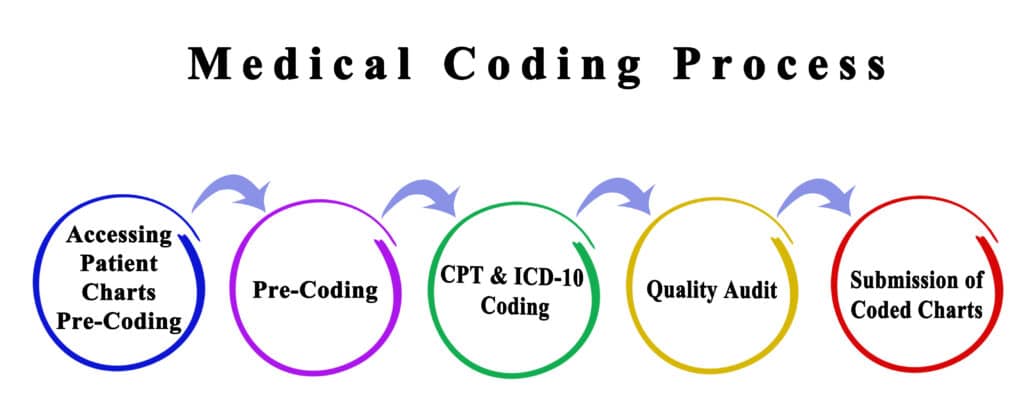
Medical coding plays a critical role in the healthcare billing process. It involves translating healthcare diagnoses, procedures, medical services, and equipment into universal medical alphanumeric codes. These codes are essential for submitting claims to insurance companies and ensuring healthcare providers receive accurate reimbursement for their services.
Here’s an in-depth look at the role of medical coding in healthcare billing:
1. Standardization and Communication
Medical coding creates a standardized language that healthcare providers, insurers, and other parties use to communicate effectively. This standardization ensures that:
- Consistency: Medical records are consistent across various healthcare settings.
- Accuracy: Accurate information is conveyed, reducing the chances of errors and misunderstandings.
- Efficiency: Streamlined processes for billing and insurance claims.
2. Facilitating Billing and Reimbursement
Medical coding is crucial in the billing and reimbursement process. Here’s how it works:
- Claim Submission: Accurate codes are used to submit claims to insurance companies.
- Reimbursement: Insurance companies use these codes to determine reimbursement amounts.
- Payment Accuracy: Ensures healthcare providers are paid correctly and timely for their services.
3. Supporting Medical Research and Public Health
Medical codes provide valuable data for research and public health initiatives:
- Data Analysis: Codes help in analyzing trends and patterns in healthcare.
- Disease Tracking: Useful in tracking the prevalence and incidence of diseases.
- Public Health Initiatives: Supports public health policies and planning by providing accurate health statistics.
4. Ensuring Compliance with Regulations
Compliance with healthcare regulations is a key role of medical coding:
- HIPAA Compliance: Ensures that billing practices adhere to the Health Insurance Portability and Accountability Act (HIPAA) regulations.
- Fraud Prevention: Helps in preventing and detecting fraud by ensuring accurate and truthful coding.
- Audit Preparedness: Facilitates easier auditing by providing a clear, standardized record of patient care.
5. Enhancing Quality of Care
Accurate medical coding impacts the quality of care patients receive:
- Clinical Documentation Improvement: Encourages thorough and precise documentation by healthcare providers.
- Patient Safety: Reduces errors in patient records, thereby enhancing patient safety.
- Continuity of Care: Ensures that patient information is accurately recorded and easily accessible for future reference, aiding in continuous and coordinated care.
6. Streamlining Administrative Processes
Medical coding helps streamline various administrative processes in healthcare:
- Workflow Efficiency: Improves the efficiency of administrative workflows by providing a clear framework for billing and documentation.
- Time Management: Saves time for healthcare providers and administrative staff by reducing the need for manual data entry and interpretation.
- Resource Allocation: Aids in better resource allocation by providing detailed insights into healthcare utilization and costs.
Key Medical Coding Systems
There are several key coding systems used in healthcare:
- ICD (International Classification of Diseases): Used globally to classify and code all diagnoses, symptoms, and procedures.
- CPT (Current Procedural Terminology): Maintained by the American Medical Association, used primarily in the United States for coding medical procedures and services.
- HCPCS (Healthcare Common Procedure Coding System): Used for coding products, supplies, and services not covered by CPT codes, including ambulance services and durable medical equipment.
Challenges in Medical Coding
Despite its importance, medical coding faces several challenges:
- Complexity: The coding process can be complex, requiring specialized training and continuous education.
- Accuracy: Ensuring accuracy is paramount, as errors can lead to claim denials and financial losses.
- Changes and Updates: Keeping up with frequent changes and updates to coding systems can be demanding.
Conclusion
Medical coding is a fundamental component of the healthcare billing process, playing a vital role in standardizing communication, facilitating billing and reimbursement, supporting medical research, ensuring compliance, enhancing the quality of care, and streamlining administrative processes. Accurate and efficient medical coding is essential for the financial health of healthcare providers and the overall functioning of the healthcare system.
For more information on how professional medical coding services can benefit your practice, contact Gables Medical Billing at 305-928-1945.

